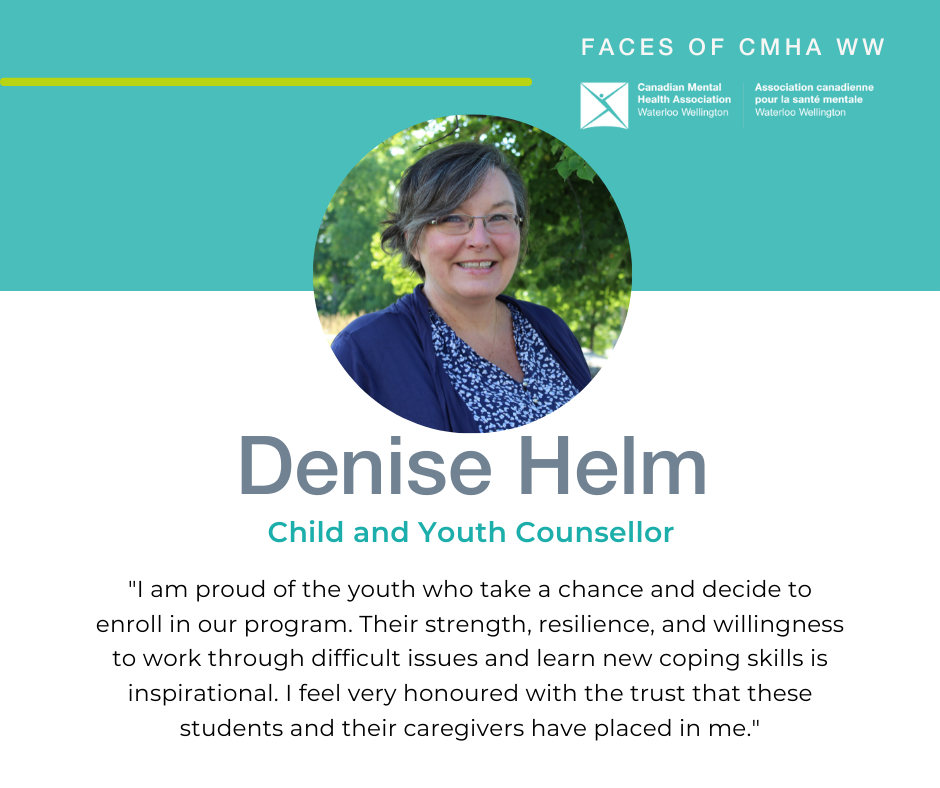Menu Close

Faces of CMHA WW: Denise Helm
Sep 6, 2022

What is involved in your role?
As a Mental Health Worker in Schools, I work in one of our Education and Community Partnership Programs in collaboration with the Upper Grand District School Board. Our programs are considered Transition Programs as the focus is supporting students in learning and practicing the skills they need to be more successful in a community school. Students enrolled in our program experience difficulties with being successful in a community school placement due to their mental health struggles.
The program in which I work provides service to youth in grades 5 to 7 and is a classroom within an elementary school. I work collaboratively with our students, families, school team, treatment teams and any other community agencies involved to develop individualized treatment and educational plans for each student. During a youth’s enrollment in the program, I support students to achieve their identified therapeutic goals. Students work on developing a variety of skills, such as self-regulation, problem solving, healthy thinking, and social skills in order to be more successful when they return to their community school.
Why did you become involved in the mental health field?
For as long as I can remember, I have always gravitated towards helping and supporting others. Even in elementary school (and that was a long time ago) I can remember volunteering to help out the loud, disruptive student who nobody else wanted to be around. I have a core belief that everyone needs someone who believes in them, that will be there to listen and support them without judgement. My drive to understand people and what drives them is the reason that I studied Psychology in university.
Mental Health is something that affects everyone and this is something that our society is learning more and more each day.
Have you always worked in mental health?
I have continuously worked with people with a variety of different struggles and disabilities, and mental health has been a big part of that. Before coming to work at CMHA WW, I have worked in developmental services for a variety of agencies with both youth and adults, and have worked in residential treatment programs with youth presenting with complex needs (severe mental health, trauma, developmental disabilities, etc.).
How do you support people in your role?
The youth that are enrolled in the program have experienced a lot in their young lives and school has not been a place that has been able to meet their significant needs. I work to build trusting relationships with youth and their caregivers using a trauma informed approach and hold space for the big emotions that students bring into school with them each day. Our school team works together to provide a safe, positive learning environment where we can start to discover the unique strengths and gifts of each student. We work very hard to ensure each student feels heard and that they belong. We support students to develop lagging skills, identify unmet needs and teach them how to advocate for themselves.
We also support families throughout the youth’s enrollment in the program to better understand and respond with empathy to their youth’s mental health needs. Parents attend a group facilitated by myself and my colleague to help caregivers learn different strategies, how to effectively advocate for what their child needs at the community school and how to build solid relationships with the community school.
When students are ready to return to their community school, we work closely with the community school team to develop and implement a transition plan that will help to ensure a successful return to school. During this process, I offer information and resources on the impacts of trauma and mental health struggles on youth and strategies to use to successfully support them. The relationships we build with community schools provide a stable path for students, and caregivers, to transition back into the larger school community.
What are you proud of during your time in your role?
There are so many things! I have been involved in this program since we started it in 2009. The program is continually adapting, growing and changing to ensure that we are best meeting the needs of our clients, and their families. In fact, we have developed such a successful model that we started another program in 2019.
I am lucky to work with a supportive team at CMHA and am in awe of their dedication, knowledge and their willingness to help each other out (especially during these difficult times we are experiencing right now).
I am also proud of the youth who take a chance and decide to enroll in our program. Their strength, resilience, and willingness to work through difficult issues and learn new coping skills is inspirational. I feel very honoured with the trust that these students and their caregivers have placed in me.
If you are in crisis or wish to discuss whether CMHA has the right service for you, call Here 24/7: 1-844-437-3247 (HERE 247).
Follow the ‘Faces of CMHA’ series for a glimpse into the lives of the people who spend each day at the Canadian Mental Health Association Waterloo Wellington working to inspire and support people to achieve the quality of life they desire. Join our team, click here to view current employment opportunities at CMHA WW.